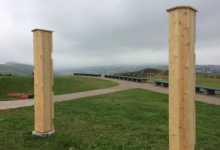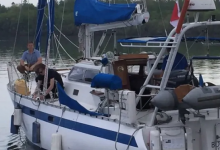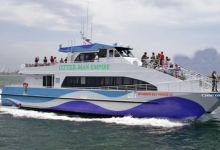Ocean tech company to map 5,000 square kilometres of Atlantic ocean floor
The Ocean Seeker slipped into Halifax harbour largely unnoticed earlier this month. The 20-metre long aluminum catamaran is tied up at a former coast guard base in Dartmouth where it will spend the winter.
Despite the low-key arrival, Ocean Seeker represents a milestone for a major Canadian program to promote the ocean economy.
In the coming months, the former RCMP patrol vessel, owned by Kraken Robotics of St. John’s, will undergo a $2-million retrofit to carry sophisticated sonars and lasers capable of capturing detailed images of the ocean floor.
In the spring, it will set out for the Grand Banks on the first of many trips in a three-year mission to map 5,000-square kilometres of seabed throughout Atlantic Canada.
Dave Shea, the vice-president of engineering at Kraken Robotics, said the company is working with commercial fishing companies, oil and gas operators, survey companies and government on the venture.
Dubbed Ocean Vision, it is the first — and so far only — project approved by the Ocean Supercluster, a joint industry-federal government program designed to spur ocean technology innovation.
The company’s sensors and software collect ultra high-resolution images over a wide area of the sea floor, down to three-by-three centimetre squares.
The images are so detailed they can map habitat, identify oil seeps, inspect underwater installations like pipelines, or look for objects that maybe shouldn’t be there for the military.
“What all of these partners are interested in is data. The ocean is one of the most challenging environments to work in and the types of data that we’re collecting in these areas is not only very, very large, but we’re talking about very high-resolution data, which was previously unavailable to these types of industries,” said Shea.
Under the Ocean Supercluster, participating companies will fund a portion of the project and share the data.
In total, Ottawa has committed to match industry spending to up to $153 million.
It has been more than five months since federal Innovation Minister Navdeep Bains travelled to Kraken’s Mount Pearl, N.L., offices to publicly announce Ocean Vision as the first Ocean Supercluster project.
A final contract to unlock spending has yet to be signed with the non-profit corporation set up to oversee the Ocean Supercluster, but Shea said he hopes the contract will be signed in the next few weeks.
Vessel cost $524K
Nancy Andrews, a spokesperson for the Ocean Supercluster, said the organization is being diligent with a program “to drive economic growth in a way that has never been done before.”
“For projects of this magnitude, and complexity, involving new project partners across different sectors, it is not unusual for contracting to take a number of months. It’s important to note that timelines will vary from project to project,” Andrews wrote in an email.
While issues like governance and how spending will flow are being negotiated, Kraken has been pulling its part of the project together and bearing the costs.
In August, it bought the RCMP patrol vessel Murray for $524,000 at a federal government surplus auction.
The ship spent three weeks in dry dock at the AF Theriault & Son shipyard in Meteghan, N.S., where it was built in 2003.
Ocean Seeker will run day trips
Kraken has also expanded its Nova Scotia operation in Dartmouth at the Centre for Ocean Ventures and Entrepreneurship (COVE) where Ocean Seeker is tied up.
The company has subcontracted with Leeway Marine to operate its research vessel.
With a cruising speed of 20 knots, Ocean Seeker will run day trips from ports in Atlantic Canada, getting to a site quickly, gathering data and returning to shore.
This winter, a forward bunk area will be ripped out to make room for sonar equipment and computers.
On the bridge, all new electronics will be installed.
“If you’re looking for a target, if you’re trying to find an object on the seabed, the captain and the surveyor can both be looking at the same data at the same time and they can see that target come up immediately in real time,” said Shea during a tour of the vessel’s wheelhouse.
Growing Canada’s ocean sector
In February 2018, the Ocean Supercluster was one of five proponents selected after a federal government competition for $950 million in innovation funding.
The proposal was led by oil companies operating in offshore Newfoundland.
Privately, local ocean technology companies in Nova Scotia have expressed scepticism about the bureaucracy being built up around the program and the mystery surrounding the mechanics.
But with contract “teething pains” nearly behind the company, Shea said Kraken can help other firms.
“It allows us to communicate our experiences to a lot of the smaller companies who have been waiting to be able to put their projects in through the cluster,” he said.
“We’re looking forward to seeing more collaboration between industries in the ocean sector and really trying to grow Canada’s ocean sector on a global scale.”
CBC








Redes Sociais - Comentários